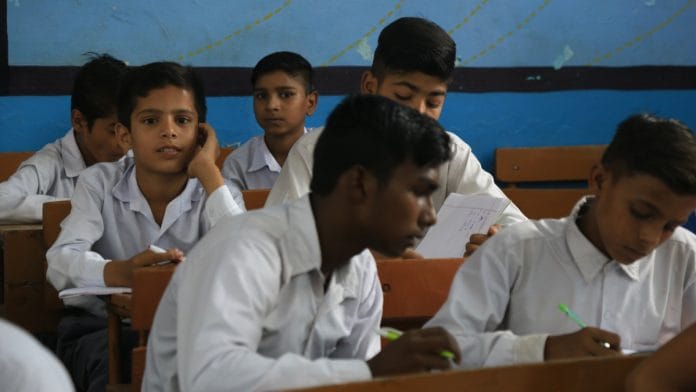A report from the Tamil Nadu Untouchability Eradication Front has revealed a disturbing reality: Around 30 per cent of the state’s schools still engage in discriminatory practices against Dalit students. They are segregated in meal queues, identified by wristbands, and often relegated to tasks like cleaning toilets.
Similar incidents of discrimination have been reported across India’s education sector, from government schools in Karnataka to prestigious varsities like the Banaras Hindu University (BHU). Two PhD scholars – one belonging to a Scheduled Caste and the other to a Scheduled Tribe – from the BHU-affiliated Mahila Maha Vidyalaya have alleged that a professor forced them to clean toilets and made casteist remarks. These cases, along with reports of suicides among Dalit students at institutions like the Indian Institute of Technology (IIT), highlight the widespread and deep-rooted challenges faced by Dalit students across educational levels. These practices not only violate their constitutional rights but also deeply impact their self-esteem and educational development.
While the Constitution – including Article 15, the Protection of Civil Rights Act 1955, and the Scheduled Castes and Tribes (Prevention of Atrocities) Act 1989 – explicitly prohibits discrimination, there remains a significant gap between regulations and real-life practices.
Many institutional administrations, largely comprised of dominant castes, often overlook or encourage prejudice against ‘lower caste’ students. The lack of enforcement of zero-tolerance policies intensifies this problem while also pointing out how institutions consistently fail to protect the rights of their students. Take IIT-Bombay’s recent food segregation policy, where it reportedly demarcated separate dining areas for vegetarian and non-vegetarian students. The administration-supported move inadvertently divided students along lines of caste, and not just dietary preferences. This situation shows that institutional policies, even when not explicitly discriminatory, can have unintended consequences that perpetuate social divisions.
Urgent need for action
Uprooting prejudices in educational institutions requires a comprehensive approach. Violations should have consequences and proactive measures—such as awareness campaigns and educational reforms—should be taken to foster equality and inclusivity. Counselling centres, such as those recommended by the Tamil Nadu Untouchability Eradication Front, are essential for prompting dialogue among parents, teachers and students and for sensitising educational communities about the ill effects of caste discrimination.
The Tamil Nadu Untouchability Eradication Front’s survey calls for urgent action from various sectors, highlighting that effective implementation of legal equality measures is needed to end educational discrimination for good. In this context, we must remember Dr BR Ambedkar’s vision, which considered education as a means to destroy caste barriers and uplift marginalised communities. His establishment of the Peoples Education Society and his emphasis on logical and scientific thinking were all geared toward social change. However, realising his vision means overcoming societal biases and aligning them with legal mandates. To create the equitable society envisioned by Ambedkar, it is imperative to ensure that every person, irrespective of their caste, receives a dignified and unbiased education.
In India, Prime Minister Narendra Modi aims to move beyond traditional caste divisions by focusing on the poor, youth, women, and farmers. However, this doesn’t fully address the evil of caste discrimination in the country. Real change requires political and educational institutions to acknowledge and tackle caste bias openly, despite the risk of severe criticism.
Also read: ‘Foul language’ not enough to invoke SC/ST Act? Supreme Court should rethink
Keep politics out of schools, colleges
The government’s emphasis on religious identities and temples could inadvertently – and dangerously – reinforce caste differences. This is evident in educational institutions where religious symbols are prevalent. To promote inclusivity, policies could be implemented to limit religious festival celebrations and religion-based political activities in educational settings, creating a more neutral and equitable learning environment that is free from caste and religious biases.
The University Grants Commission (UGC)’s now-withdrawn directive to create ‘Modi’ selfie points in colleges raises concerns about political activities in educational environments. It can be seen as a deviation from the principle of keeping political activities separate from educational institutions. Such moves promote a one-sided portrayal of political figures and overshadow the educational objective of teaching students about a diverse range of political perspectives and historical figures.
India’s space achievements, like the Chandrayaan-3 moon mission, starkly contrast with its social stratification issues. True scientific progress requires adherence to human equality principles. Introducing religious elements and political agendas into educational institutions risks backsliding India’s progress – potentially back to an era where scientific rationale is outshone. The government and its machinery must realise the importance of maintaining a clear separation between educational institutions and political/religious ideologies. They should ensure that schools, colleges, and universities remain sanctuaries for unbiased learning and scientific inquiry.
In educational settings, treating all individuals equally is crucial. The government’s role is critical in enforcing zero-tolerance policies against caste discrimination. Strict measures are necessary, including holding administrations accountable under Article 15 and the SC&ST Atrocities Prevention Act, to prevent tragedies like Rohit Vemula’s case and to eliminate caste bias in not just Tamil Nadu but across India.
The author is the president of Foundation for Human Horizon, a UN-affiliated NGO that’s leading the Anti-Caste legislation movement in the USA, and an Artificial Intelligence (AI) Research Scholar at Johns Hopkins University. Views are personal.
(Edited by Zoya Bhatti)






